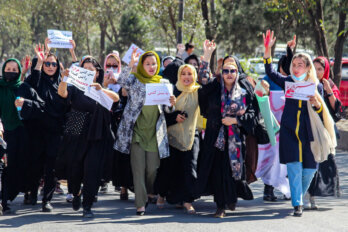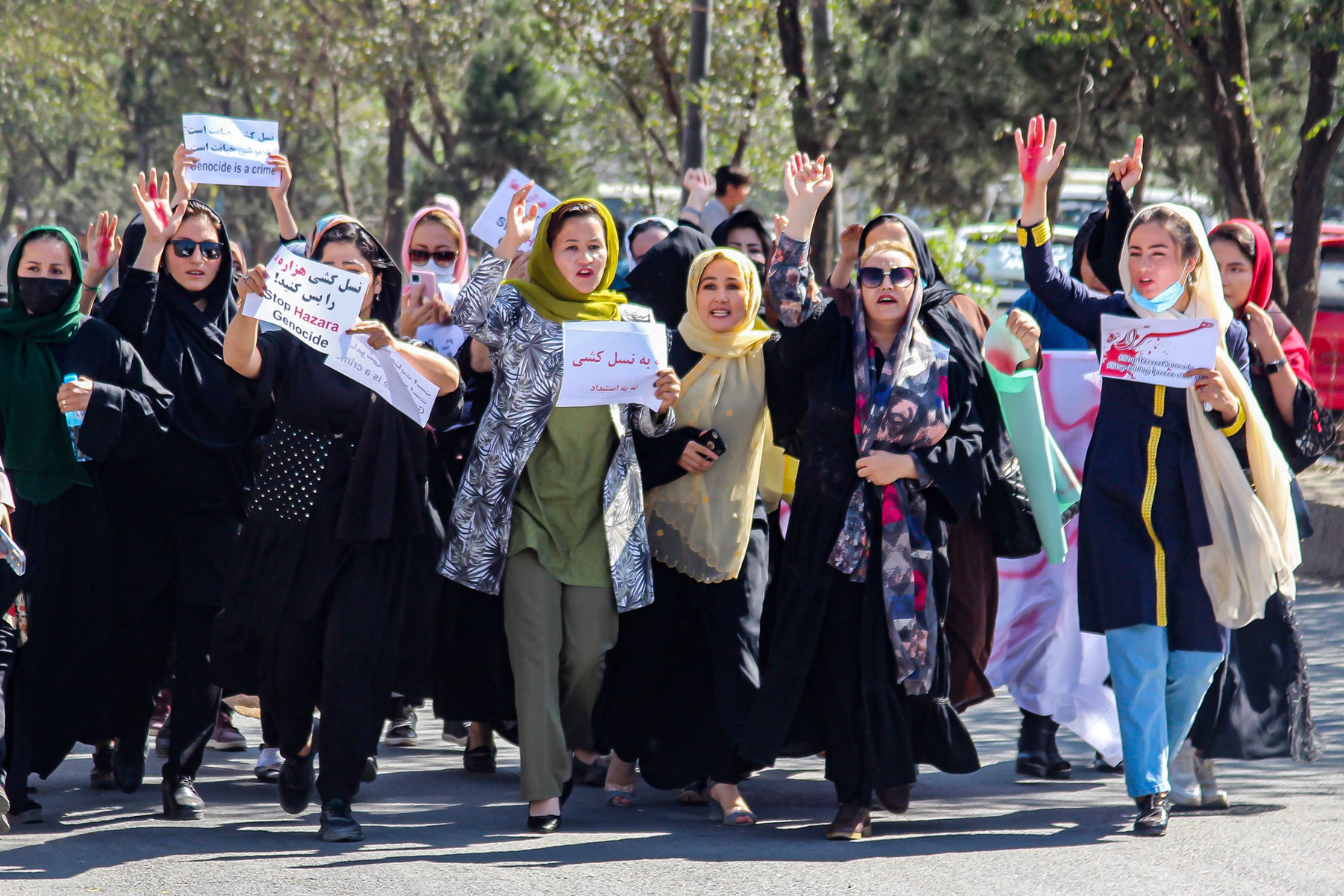
WORLD / JANUARY/FEBRUARY 2025
In Afghanistan, Women Haven’t Given Up
Despite jail, torture, and death threats, activists are resisting the Taliban in the country and abroad
BY SORAYA AMIRI AND SAMIA MADWAR
Published 6:30, DECEMBER 9, 2024

این مقاله به زبان دری در دسترس است.
On December 2022, Roqia Saee joined dozens of other Afghan women at a crossroads near Kabul University to protest a Taliban decree that banned women from universities. The organizers invited journalists to cover the event, but most outlets declined to send reporters for fear of arrests by the Taliban, Afghanistan’s de facto authorities. So Saee used her phone to take photos and send them to the media.
Shortly after the protest started, some Taliban members drove up, grabbed a few of the women, and pulled them into their cars. Saee had left her two young children, who were six and nine at the time, with her neighbours. She quickly got into a taxi and started heading to an area close to her home.
Soon, Saee says, another car started following the taxi, forcing the driver to stop. Taliban members stepped out to question him, and the driver insisted he was just doing his job. The officials then turned to Saee, taking her purse and demanding that she unlock her phone. When she refused, they punched her. She finally entered her passcode.
When the Taliban saw the photos she’d taken at the protest, they accused her of working for Americans and called her names like “fahisha,” or prostitute. They forced her out of the taxi and into one of their cars, pulling a black plastic bag over her head and wrapping it around her neck so tightly she yelled that she could barely breathe.
Saee knew protesting might get her arrested or killed. The previous September, the Taliban had banned unauthorized protests, and its members had regularly attacked activists and journalists on the scene, detaining some, usually arbitrarily. That didn’t stop women from marching in the streets, chanting slogans like “Naan, kar, azadi”—bread, work, freedom—after the Taliban retook Kabul on August 15, 2021, amid the frenzied withdrawal of US troops. The demonstrations, which often made international headlines, continued sporadically over the following months in response to the Taliban’s ongoing brutality. Afghan Witness, an investigative project from the UK-based Centre for Information Resilience, has documented at least 170 street protests between August 2021 and June 2024. Many of the demonstrations have been organized locally by women’s rights groups and are typically coordinated via WhatsApp.
After her arrest, Saee says, she was held for four days. The Taliban interrogated her, often at gunpoint, about who was really behind the protests and who was paying her to speak out against them. “I just said, ‘I lost my husband, and I don’t have anybody to fight for me or pay for my kids,’” she recalls. Her husband, an officer in the Afghan army, had been killed fighting Taliban insurgents in 2020. She had hoped to serve in the army herself. But when her husband died, she had to instead take on whatever work she could find—cleaning houses, sewing clothes—to support her family. Many days, she couldn’t afford gas to cook food or make tea. Her children often went hungry, eating only naan. She couldn’t buy them new clothes when they outgrew their old ones. Her situation mirrored that of many women in Afghanistan who have lost the men in their families to war and are now mostly forbidden from working, leaving them with no way out of poverty.

“I had several reasons for joining the protests. I was concerned about the future of the Afghan people, especially the new generation, the children of Afghanistan, and my own children. I fully understood and deeply felt that the Taliban regime is a murderous, misogynistic, and extremist regime. With their complete control over Afghanistan, there would undoubtedly be widespread oppression and crimes. Therefore, I decided to go with my like-minded people and stand against them.”
Saee says there was a security camera in the cell she was detained in, but the prison guards often took her into another room with no camera and beat her repeatedly. She closed her eyes so she couldn’t see what they were hitting her with. Sometimes, she says, it felt as though they were striking her with their guns. Her entire body hurt, especially her stomach. Whenever she passed out, the jailers poured cold water on her to revive her and began interrogating her again. At one point, they showed her photos of her children on one of their phones. She begged them not to hurt her family.
Saee is one of dozens of activists who have been jailed in Afghanistan—some more than once and some with family members or associates—and now live in exile. Many say they endured physical violence, unhygienic conditions, and psychological torment during their detainments. They were released after family members, community elders, or contacts outside Afghanistan advocated for them and signed guarantees that the women would cease protesting. The Taliban forced the detainees to make certain promises, including that they would support the regime, that they would never speak with the media again, and that they would stay in Afghanistan.
Saee was let out of prison after her father advocated for her. But she continued to protest and was briefly detained again, in March 2023, when she was forced to make the same promises. Like many of her fellow exiled activists, she has broken every one of those promises. That May, she and her children fled Afghanistan and now live in Germany.
For Saee and other activists, speaking out about their brutal detentions is a necessary sacrifice. Going public may endanger any family members still in Afghanistan, and some of the activists have faced online threats and harassment. But it’s one of their only means of resisting the normalization of Taliban rule—a reminder to the international community that, for many Afghans, daily life in the country feels like being locked up. Saee never expected the demonstrations to change the Taliban. “Our request,” she says, “was for the world to stand behind the people of Afghanistan.”
But it was seemingly easier to grab world headlines when activists were marching in the streets, defying death. Now that many have fled the country and there are fewer public protests, it’s harder to get anyone to listen.
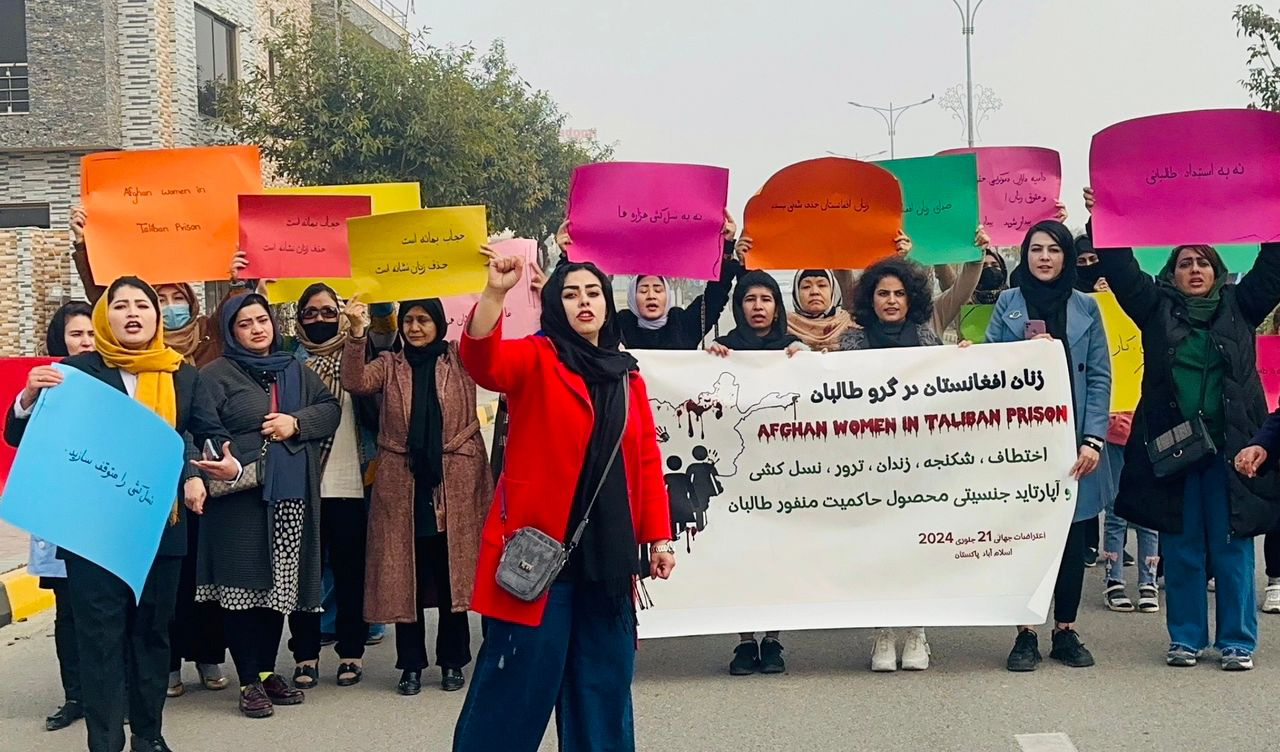
Based on social media posts and news stories, Afghan Witness estimates there were about 100 reported detainments of women protesters between October 2022 and March 2024. But a comprehensive count may be impossible.
Richard Bennett, the UN special rapporteur on the situation of human rights in Afghanistan, has toured several public prisons and interviewed former detainees. The numbers, he says, are likely underreported. And since some detainees are held for hours and others for days, weeks, or months, the figures alone “don’t necessarily reflect the suffering.”
Based on his interviews, detainees’ experiences range from verbal abuse and interrogations to alleged beatings, torture, and sexual violence, including rape—which some men and boys who are imprisoned by the Taliban are also subjected to. “There are also claims of killings,” he says, “though that is very hard to determine.”
Some activists are detained in prisons run by the de facto government authorities, while others are taken to privately run jails or the central intelligence office, where most of the violations are said to have taken place. In news reports, the Taliban have denied arresting activists or mistreating women in prisons, and they assert that their actions comply with Sharia law. (The Taliban’s primary spokesperson declined to be interviewed for this story.) When family members who were not in prison asked about detainees, the Taliban frequently denied having arrested any protesters. Likewise, during their detainment, many activists didn’t know whether family members were also imprisoned. The uncertainty was, in itself, a form of torture.
Bennett has intervened by sending official letters or text messages to Taliban authorities asking to have detainees released. (The United Nations Assistance Mission in Afghanistan, or UNAMA, also intervenes, though not as publicly.) It’s never clear how effective those efforts are, he says. “It’s always hard to know, because . . . there isn’t a direct causation, if they are released.” And while the UN and the international community often condemn Taliban violence, Bennett says, some countries choose to look the other way. (Bennett’s last official visit to Afghanistan was in the spring of 2023; since then, the Taliban have barred him from the country.)
Afghan activists have described the Taliban’s oppression as a form of apartheid since 1999—since the group’s first period of rule.
Sayara Dashty established the Fahim Dashty Foundation in honour of her late husband, a popular journalist who was killed by the Taliban in September 2021, to promote freedom of expression in Afghanistan. Now based in Mississauga, Ontario, she has also been documenting cases of child abuse in Taliban-run madrasas, or religious schools, over the past three years. Dashty is in touch with Afghans still in the country. They report that children as young as eight are beaten for making innocent mistakes, such as forgetting to start a sentence with a prayer; some are also victims of sexual violence.
Over time, says Dashty, those children will become indoctrinated. Some may be trained to do the Taliban’s bidding, including planting explosives or carrying out suicide bombings. They may grow up spreading Taliban messaging online, inciting others around the world who may be prone to radicalization—and who might be emboldened by the international community’s seeming indifference.
Such fears aren’t new. When the Taliban seized power in 2021, they presented themselves as a somewhat reformed group, says Heather Barr, the interim women’s rights deputy director at Human Rights Watch. At the time, some international diplomats suggested that the Taliban’s pragmatic wing would not deny women an education or smother Afghans with draconian restrictions. But Afghan women, she says, knew better.
“[T]he women protester movement has been the most serious threat to the Taliban,” says Barr. “And so I think the Taliban decided very early on that it was a big priority for them to crush these protests.”
Tamana Zaryab Paryani started protesting against the Taliban in 2017 and continued to do so after the group returned to power, even as scores of journalists, members of parliament, and human rights activists fled the country, leaving few behind to advocate for Afghans. She would tell herself that it was worth staying, that “even if I die, I will die in this country.”
But on the night of January 19, 2022, Paryani, then twenty-four, was at home with her three sisters when the Taliban came to their door and threatened to break through. She had tried to conceal her identity during protests and on social media, yet Taliban members had tracked her down.

“When I look [at] the Taliban, they just want [women to] stay at home—they marry, they make children, they make something for their husbands. When they prepared to release us from the jail, it was middle of the night. I just told them, ‘In twenty years, we lost a lot of men [who were in] the military. And some families, they don’t have any big boys; or some women, they have children, they don’t have husbands. And who is responsible for them? These women work to bring food for their children, and if they don’t work, what [will] they eat? Their children want to eat something. They want food.’ And they had no answer for that.”
Using her phone, she recorded a video of herself screaming at the voices on the other side of the door, telling the Taliban members she couldn’t let them in, that they should come back the next day. She sent the video to a journalist friend and then threw her phone out the window before the Taliban broke down the apartment door and charged in. Paryani and her sisters were rushed out and driven to prison. (Parwana Ibrahimkhail Nijrabi, another prominent activist, was also arrested that night.)
The sisters were detained for about twenty-six days, a time Paryani prefers not to describe much other than to call it a nightmare. She wasn’t allowed to speak with her sisters, who were held in a separate cell, or with any family members outside the prison. Like Saee, she was regularly taken to a room without a camera; Paryani says she was whipped with a cable and beaten.
The video of her arrest spread widely on social media, leading to international coverage of her detainment and condemnation from groups such as Human Rights Watch. Taliban members would question Paryani about the attention she was getting from foreigners. “Why are you so important?” she recalls them asking her. She told them it was because people knew what had happened to her.
Before the Taliban allowed the sisters to leave, their father was made to record a video in which he promised that his daughters would no longer protest. That night, Paryani and her sisters returned to their apartment to change their clothes, then left for a safe house. They lived in hiding for several months, but Paryani still tried to revive the protests in Kabul. “We had to continue our way,” she says. But when she reached out to some of the other organizers, they declined to join her, out of fear that they, too, might be detained. She realized then that she was on her own. Not knowing whom she could trust, she didn’t tell any of her friends or fellow protesters about her plan to escape. In August 2022, she and her sisters crossed the border into Pakistan. That October, they arrived in Germany.
In the short term, news of the sisters’ arrest had a chilling effect on protests across the country. But ultimately, says Zholia Parsi, the detainment and the worldwide attention Paryani’s arrest video had generated spurred other women to keep up the fight.
A former government worker and a mother of five, Parsi lost her job when the Afghan government fell to the Taliban. Within weeks, she launched the Spontaneous Movement of Afghanistan, and over the following two years, she attended thirty-eight protests, twenty-two of which she organized.
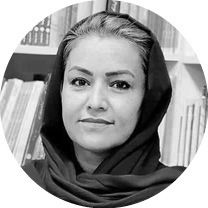
“When you decide to struggle and stand against a terrorist group, you inevitably think about the possibilities of being imprisoned, killed, or having your family harmed. These were the issues we anticipated and discussed among ourselves before starting the struggle.”
Parsi evaded capture by staying with various relatives. But after going home to attend a family member’s funeral in September 2023, she was arrested along with her adult son, Azarakhsh, and imprisoned for three months. Now forty-three, she says her joints still ache from when her jailers bound her to a chair, twisting her arms behind her back to tie her hands together.
For a while, Parsi says, she was held in a solitary cell, and she ate little more than an apple every day. It was nearly impossible to sleep. She frequently heard screams and would wonder if they came from her son. During interrogations, Taliban officials showed her videos of Azarakhsh being tortured, and they threatened to arrest her daughters. She worried that, to punish her, they might force her two youngest daughters—who were seventeen and nineteen when she began protesting—into marriage with Taliban members. (The Taliban have officially prohibited forced marriages, though reports show they continue to take place.)
In the three months that Parsi was imprisoned, she says, she was able to see Azarakhsh twice and other family members four times—visits that lasted no longer than seven minutes. “It was very, very hard for me when I saw my son,” Parsi says, recalling how thin he’d looked. “It’s impossible to impart a mother’s feelings.” Though her son has never spoken to her directly about his experience, Parsi says she learned from his wife and sisters that he was put in solitary confinement for days at a time and held in a dark cell where it was difficult to breathe. There was one opening just large enough for some bread to be pushed through for him to eat.
The Taliban released Parsi and her son after extorting the usual guarantees from family and community members. Now living in exile, Parsi fears for relatives who vouched for her and who are still in the country. But she doesn’t plan to stop protesting.
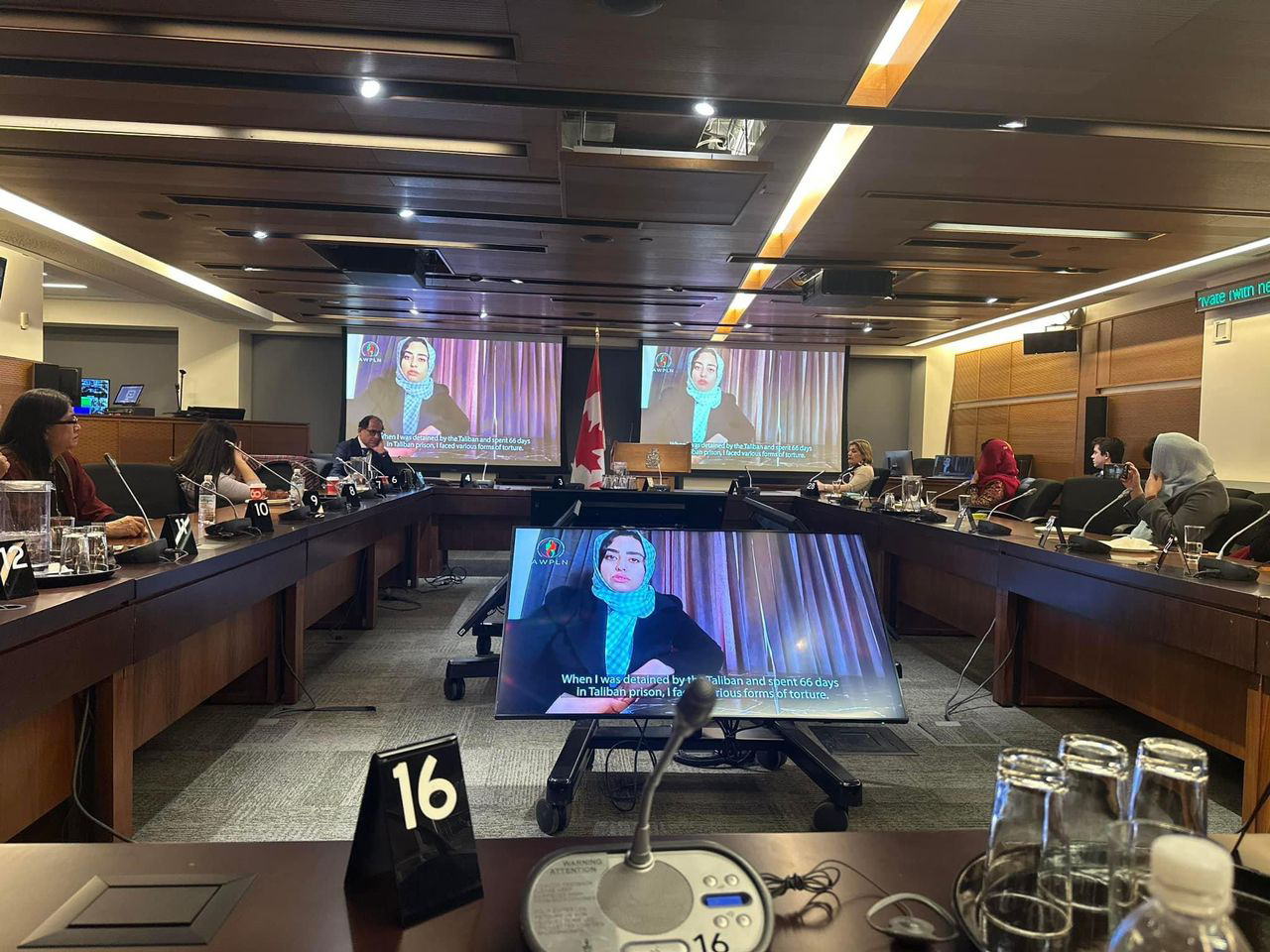
The former detainees’ testimonies reveal a pattern of torture that, along with the infliction of physical and emotional violence, seems to feed on deep prejudices in Afghan society. Many of the detained protesters received especially harsh treatment based on their ethnic or religious identities. The Taliban are a Pashtun-majority Sunni group; Saee is Hazara, a persecuted Shia minority; and Paryani and Parsi are both Tajik, an ethnic minority. (“I like to call myself a human being,” Paryani clarified in response to a question about her identity. “Other issues are not important.”)
Narges Sadat, who is also Shia, was arrested twice. The second time, she was held for sixty-six days; during that detainment, she was tortured not only by male Taliban members but also by three female prisoners who’d been involved with Daesh, or the Islamic State. Among other forms of abuse, they would taunt Sadat about explosions that Daesh had masterminded, including one in October 2022 at an education centre that killed more than fifty in a predominantly Hazara neighbourhood in Kabul. “We did that,” Sadat recalls the women screaming at her.

“During the sixty-six days I was imprisoned by the Taliban, I spent thirty-five of those days in solitary confinement, which I will never forget. I also spent three days and nights with ISIS women detainees, which was an immense psychological torment and deeply distressing for me. After thirty days, I was finally able to see my mother, son, and sister, but only after immense international pressure and advocacy from human rights organizations. When I was about to meet my family, the Taliban issued me severe warning beforehand. They threatened me that if I spoke about my experience there or raised any complaints, it would result in my family being imprisoned as well. Their threats were extremely serious, and every moment and every minute of that time was sheer torture and agony for me.”
Some forms of torture served to blackmail the activists into silence. The Taliban filmed some detainees while they were naked or were wearing only a bra, threatening to release those videos if the women continued speaking out. Many detainees heard the voices of other imprisoned women begging not to be raped. (In an August 2024 report, Bennett documented instances of sexual assault against detained women.) In July, journalists from the Guardian reported that they, along with members of Rukhshana Media, had viewed a video that showed an unnamed woman protester being raped by two men. One of the men accuses the woman of having prostituted herself to Americans in the past and says that it was now their turn. “There have been mounting reports that sexual violence is being inflicted on women and girls being held in detention in Afghanistan,” the Guardian article states, “but this video is believed to be the first direct evidence of these crimes occurring.”
Wahida Amiri (no relation to this article’s co-author), who had operated several libraries across Afghanistan before the Taliban’s return to power, was jailed for her activism in February 2022. She says that while she was not sexually assaulted during her detainment, it is widely assumed that all women who are jailed by the Taliban are raped. There is severe stigma attached to even the possibility of sexual assault, to the extent that, after their release, many female detainees may face dangers such as honour killings. Given the consequences, “it’s a very potent weapon for the Taliban,” says Barr, “to use either sexual violence or the implication that there could be sexual violence.”
Some interrogations paint the women as traitors, whether to their country or to the other protesters. While Paryani was detained, the Taliban showed her photos of other protesters, demanding that she reveal the women’s identities. Though she refused, she says, the Taliban offered to recruit her as an informant once she was released. She told them she would consider it after she had recovered from her detainment, though she had no intention of actually doing so.
Amiri says that, during her detainment, Taliban members interrogated her about her links to the National Resistance Front, an anti-Taliban militia. She denied having received any support from the NRF. Before she was released, the officials recorded her giving a forced confession, based on a script they’d provided, saying that she had protested in the hopes of raising her public profile and receiving money from donors abroad to help her leave Afghanistan.
That line of questioning and the video script, says Amiri, reflect a common assumption among the Taliban that women are incapable of carrying out protests without outside influence. But then, much of the world, she says, underestimates Afghan women—whether openly or not.
Now thirty and living in Germany, Saee has little money and is nervous about being deported. Her children, eight and eleven, are going to school. Still traumatized by her arrest, they often question her when she leaves the apartment on her own, fearful she’ll be taken away again.
Saee has joined a program that offers online educational resources for women and girls in Afghanistan. She tries to connect with women there to share her experiences of being detained and leaving the country. It’s important, she says, that they understand the risks of speaking out. Even as street protests have all but vanished, many Afghan women still protest online, broadcasting their indoor demonstrations on social media.

“In the mindset of the Taliban and their supporters, they have no belief in educated women; in fact, they fear them. The Taliban think that Afghan women should only stay at home, be good wives, and be good mothers.”
Paryani believes the Taliban are relieved that she and other women protesters have left the country. That they presumably can’t stir up as much trouble now. Even outside of formal demonstrations, the Taliban were reportedly breaking up small groups of women, “arguing the need to prevent protests,” according to a 2023 report by Bennett. This past July, the Taliban issued further restrictions, including that women’s faces must be covered and their voices not heard in public.
Paryani and some of her family members were granted temporary protection status in Germany. She’s in touch with Saee and other activists abroad and has joined marches in support of Iranians in the diaspora protesting against their home country’s repression of women. She has organized protests for Afghan women in eleven German cities, though it often takes time to be granted permits. When she does receive them, they are usually for remote spots, leaving her and her “Hunger strike” sign largely unnoticed. With limited weekend transit, she depends on a friend to drive her to the protest sites.
In July 2023, Paryani began to focus her messaging on ending gender apartheid—systemic, institutionalized oppression based on gender, “committed with the intention of maintaining that regime,” according to a UN definition. Afghan activists have been describing the Taliban’s oppression as a form of apartheid since 1999—since the group’s first period of rule. In theory, just as the codification of racial apartheid forced the international community to denounce the crime in South Africa and Namibia in the 1960s, so, too, would criminalizing gender apartheid push countries to exert pressure on Afghanistan and Iran now.
The gender apartheid campaign has coalesced into a global effort led by Afghan and Iranian activists, with the aim of legally recognizing the practice as a crime against humanity in international law. While several crimes against humanity are addressed in disparate treaties, there is a process underway at the UN to propose a convention that covers all crimes against humanity, and advocates are calling for gender apartheid to be included. Several countries, including Australia, Mexico, and the US, have expressed support. So far, Canada has not.
In March, ahead of International Women’s Day, Sayara Dashty organized a delegation of Afghan and Iranian women that met with Canadian parliamentarians, senators, human rights leaders, and other public figures during a day-long summit in Ottawa. Zarifa Yaqobi, a frequent media commentator and a founder and board member of the executive committee for Afghanistan’s first female-led political party, spoke about the physical torture she’d endured in prison. Now living in Calgary, she was arrested in November 2022 and detained for forty-one days without any formal charges against her.
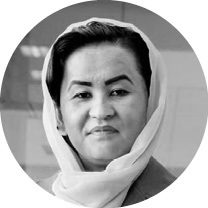
“Currently, we are in Canada as immigrants, adapting to these circumstances. At least the security is better than in Afghanistan. Physically, we are here, but our hearts and minds are still with our homeland.”
Ali Ehsassi, member of Parliament for Willowdale, Ontario, helped Dashty organize the event and later presented a petition to the House of Commons on the delegation’s behalf, calling on the Canadian government to take a leading role in criminalizing gender apartheid. (A related motion passed in the Senate this past June, though it was largely symbolic.) The petition describes the Taliban’s acts of “violence, torture and other ill-treatment, enforced disappearances, sexual violence and executions.”
Over a month later, the government issued a lukewarm response. “Along with many likeminded allies,” it read, in part, “Canada will continue to condemn the mounting restrictions and intimidation faced by Afghan women and girls and to urge the Taliban to respect the human rights and fundamental freedoms of all Afghans.”
Afghan advocates were disappointed; in an interview in June, Yaqobi said she hadn’t seen any significant results from her work with Canadian parliamentarians and other international organizations. “The reality is they don’t support Afghan women very well,” she said.
Many activists believe that codifying gender apartheid may be one of the only means of preventing the international community from recognizing the Taliban as Afghanistan’s legitimate government. While a legal process “doesn’t immediately halt the abuse that’s happening,” says Barr, “it does change the discussion quite significantly, and it makes other countries start to think about whether they are being complicit in serious crimes that are happening.” When UN officials met with Taliban leaders in Doha in June to address how the international community could engage with Afghanistan, they were widely criticized for capitulating to the Taliban’s demands not to include women or Afghan civil society representatives in the meeting.
But introducing a new convention at the UN is a long road, says Barr. And there are other legal avenues. The International Criminal Court is investigating potential crimes against humanity by the Taliban and the Islamic State, specifically “crimes involving sexual, reproductive, and other forms of gender-based violence.” At the UN General Assembly in September, Canada, Germany, Australia, and the Netherlands brought forward an initiative against Afghanistan, charging the Taliban with discrimination against women, which could proceed to the International Court of Justice. Habiba Sarabi, formerly a governor in Afghanistan and a participant in peace talks between the Taliban and the previous Afghan government, is a member of the advisory group gathering evidence for the case, including testimonies from women. But she has repeatedly cautioned Afghans against getting their hopes up. Women, in particular, are all too familiar with disappointments.
In Germany, some locals tell Paryani she doesn’t need to go on protesting against the Taliban now that she’s safe. But like other activists, she feels a responsibility to continue speaking up for Afghans. She knows it will be a long time before they see any positive change. Until then, if world leaders act surprised at the Taliban’s cruelty, Paryani says, “We will say to them, ‘We told you.’”
This story was made possible by Journalists for Human Rights and The Walrus Contributing Writers program.
